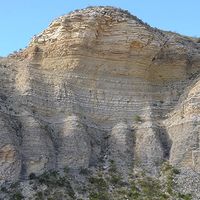Geology
Jump to navigation
Jump to search


Geology, in its broadest and simplest definition, is the science of the earth.

West Texas' Lozier Canyon offers an opportunity to examine Eagle Ford Shale outcrops at various scales across a sizable area. Photo by Art Donovan. Courtesy of the AAPG Explorer. See more in the AAPG Explorer.
A more comprehensive definition would be:
Geology is the study of the earth's constitution, history, and structure as disclosed by the sequence of rock formations and the evidence of their deformation and alteration.[1]

Miocene rocks in the northeastern limb of the Youshashan anticline and sculptured by fluvial incision and wind erosion. Courtesy AAPG Bulletin, June 2014.
Such a definition includes the many fields of specialization which have grown up with the science:
- Stratigraphy is sometimes called historical geology. This has for its province the identification of the chronological successions of rocks and their correlation. It must rely on paleontology for evidence from fossil remains and on petrology for composition, texture, and mineral content in order to establish this succession. The earliest work of the geologist was concerned with the correct succession of rock formations and it still remains a field of primary concern to all geologists.
- Both because of the greater value of their contained minerals and the greater ease of identification and correlation, sedimentary rocks engage the attention of all geologists. The field of specialization which is now called sedimentology is rapidly becoming an invaluable aid in stratigraphy. This field has for its study the processes and agencies through which layers of sediments are deposited and built up into formations. It is commonly true that the proper succession of rocks can be established only by reconstructing the environment, agencies, and processes prevalent during the deposition of a particular layer of sediments.
- All rocks undergo change after original formation. This may involve nothing more than simple compaction due to overburden or it may bring such complete alteration as to leave little evidence of the original form and character of the rock. Physical or dynamic geology is the name commonly applied to the field of specialization which seeks to establish agencies and processes which bring about these changes. The name physical geology in its proper sense denotes the application of the principles and laws of physics and chemistry to the change which rocks undergo, both deep in the earth and at the surface.
- In addition to physics and chemistry, whose principles and laws are directly applied to problems of geology, numerous other sciences must be used for collateral aid. For example, botany, zoology, and other biological sciences supply knowledge of living plants and animals to aid in deciphering the history of organic evolution left by fossil remains. Mathematics, particularly geometry and trigonometry, enables one to think in the three dimensions required to visualize the shape of folded beds.
And so, geology, the science of the earth.
See also
References
- ↑ Denison, A. R., 1944, A challenge to geology: AAPG Bulletin, v. 28, no. 7, p. 897-901.